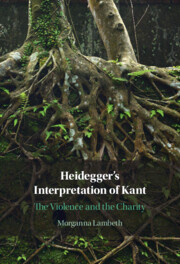Book contents
- Heidegger’s Interpretation of Kant
- Heidegger’s Interpretation of Kant
- Copyright page
- Dedication
- Contents
- Acknowledgments
- Abbreviations
- Introduction
- Chapter 1 The Two-Strand Method of Interpreting Kant
- Chapter 2 The Receptivity and Spontaneity of Cognition
- Chapter 3 A Common Root
- Chapter 4 The Metaphysical Deduction and Schematism
- Chapter 5 The Transcendental Deduction
- Chapter 6 The Form of Time and Self-Affection
- Conclusion
- Coda
- Bibliography
- Index
Chapter 5 - The Transcendental Deduction
Published online by Cambridge University Press: 01 June 2023
- Heidegger’s Interpretation of Kant
- Heidegger’s Interpretation of Kant
- Copyright page
- Dedication
- Contents
- Acknowledgments
- Abbreviations
- Introduction
- Chapter 1 The Two-Strand Method of Interpreting Kant
- Chapter 2 The Receptivity and Spontaneity of Cognition
- Chapter 3 A Common Root
- Chapter 4 The Metaphysical Deduction and Schematism
- Chapter 5 The Transcendental Deduction
- Chapter 6 The Form of Time and Self-Affection
- Conclusion
- Coda
- Bibliography
- Index
Summary
This chapter reconstructs Heidegger’s interpretation of the Transcendental Deduction and addresses the common objection that Heidegger’s interpretation cherry-picks evidence from Kant’s text, failing to address counterevidence adequately. The chapter argues that Heidegger both acknowledges and addresses the counterevidence cited by his critics. Specifically, Heidegger identifies that counterevidence as a component of a traditional strand of argument that is less compelling than other, more radical ideas in Kant’s text. On the traditional strand of argument, Kant attempts to spell out the a priori contact between sensibility and understanding by identifying a form of atemporal self-consciousness, apperception, that uses concepts to actively unify our sense experience. Heidegger is critical of this strand of argument because it remains unclear how apperception, construed as atemporal, can be unified with our temporal sense experience. How do two unlike things come together – time and not-time? Heidegger argues that one arrives at a more convincing account by developing the temporal dimension of apperception, where it holds up expectations for the future. This development helps one appreciate the deeper unity of our passive sensing of the present and our active anticipation of the future – a unity grounded in the temporal structure of the imagination, three interlaced temporal capacities that characterize the human being.
Keywords
- Type
- Chapter
- Information
- Heidegger's Interpretation of KantThe Violence and the Charity, pp. 133 - 159Publisher: Cambridge University PressPrint publication year: 2023



